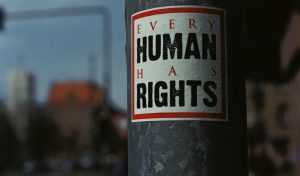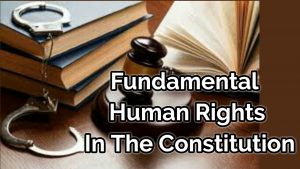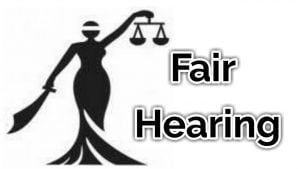Limitations of Fundamental Human Rights: It is a truism that ideas and concepts are not absolute. So, one of the attributes of a good principle or idea is that it is not absolute. Fundamental Human Rights just like other good principles of law are also not absolute. There are some limitations that exists with respect to the exercise and enjoyment of these rights.
This article gives a good explanation of the meaning of fundamental human rights, and outlines a few of these rights. These the limitations that affect the enjoyment of these rights are properly discussed. While humans are entitled to these fundamental human rights, there are some limitations that exist that must be understood for the proper enjoyment of these rights.

Recommended: Different Schools of thought in Law
Meaning of Fundamental Human Rights
Fundamental Human Rights are basically those rights which we are entitled to enjoy by virtue of the fact that we are humans. These rights are available to all humans irrespective of their age, colour, religion, tradition and backgrounds. They are usually guaranteed by law.
The United Nations define Fundamental Human Rights to be rights inherent to all human beings, regardless of race, sex, nationality, ethnicity, language, religion, or any other status. These rights according to the UN are universally guaranteed.
Fundamental Human Rights include the right to life, right to fair hearing, right to freedom of movement, right to freedom of speech, right to privacy, right to freedom of religion, et cetera.

Recommended: Advantages and Disadvantages of Judicial Precedence
Limitations to Fundamental Human Rights
There are different limitations that apply to fundamental human rights. The following are some of the limitations to these rights:
1. Right to Life: This is the most acclaimed fundamental human right. Every human being has a right to be alive and for his life not to be taken by another individual. There are however some limitations to this right in different statutes. One of the limitations to this right is the execution of the sentence of a court with respect to a criminal offence for which a person has been adjudged guilty.

By virtue of this, a person’s right to life may be taken if it is found that such person has committed a crime for which the punishment is a death sentence. This limitation can be found in s. 33(1) of the Nigeria 1999 Constitution. Also, it will not be considered as a breach of a person’s right to life, if such life was taken by the use of reasonable force to defend one’s self or property as provided in Section 33(2) of the Nigeria 1999 Constitution. Also, in a bid to suppress a riot or mutiny, a person’s right to life may be breached by another.
2. Right to Fair Hearing: Every person who undergoes a civil or criminal matter is entitled to be heard by the court or adjudicatory body before a decision is reached. This right is also not absolute. Where a person is offered the opportunity to speak and defend himself, and such person fails to take such opportunity, such a person cannot complain of this right being breached.

Also, this right to fair hearing involves a right to be represented by a lawyer of one’s choice. There is a limitation to this as the lawyer must be one who is entitled to practice law in Nigeria and not under any legal disability- Awolowo v. Minister of Internal Affairs.
Also see: Can the Supreme Court overrule itself? Answered
3. Right to Freedom of Movement: While every individual is considered to be entitled to this right to move freely, there are some limitations. One of the limitations associated with this right is the restriction of a person from entering into the private property of another without consent. Doing this amount to trespass and an action may be instituted a trespasser for violating and encroaching into the land of another.
While a person is entitled to move around public places, this right is restricted as it relates to private property. Also, there are instances where the government may place a restriction on movement during some specific timeframe. Moving within such timeframe amounts to an offence irrespective of the fact that such person have a freedom of movement.
4. Right to freedom of speech: This is the right that entitles a person to speak freely whatever opinion he has. One of the limitations there is to the right to freedom of speech is that a person is not allowed to make false statements or defamatory statements, capable of bringing another person to disrepute.
This will ordinarily amount to defamation. So, while a person is generally allowed to speak as he pleases, this must not be done to the detriment of others. This right does not entitle a person to get involved in hate speech, or make statements that will likely bring about disruptions and issues within the country.
Recommended: How to become a successful lawyer
5. Right to Privacy: This is the right of an individual to carry on affairs of his life without any disturbance or interference from any other person. In modern times, this right involves the right to data protection by employers and those who come in contact with one’s data.
Even this right has some limitations, for instance an employer may violate the right to privacy and use some of the data of an employee in defense of a court action brought against such employee. Also, where a crime is suspected to have been committed, the court may be approached to give an order permitting the violation of the right to privacy which an individual ordinarily possesses.
6. Right to Freedom of Religion: While the law allows for people to select the religion of their choice, the law will not allow for the application of a religious principle which goes against reasonability.
Thus, for instance where a particular religious belief prevents a member of the religion from allowing blood transfusion to the child, the law will not allow such religious belief to stand. The law will always step in to declare a religious belief as unreasonable and barbaric when such belief does not attune to reasonability.
Recommended: A day in the life of a lawyer explained (See what lawyers do daily)
Conclusion
Truly, as humans we are entitled to some specific rights. However, these rights are to be enjoyed in a manner that does not affect the rights of our neighbors. Also, these rights generally have some limitations to how they are expressed and enjoyed. We must therefore bear these limitations in mind, so as to protect ourselves and not run into problems.
Our rights usually end where another person’s rights begin. So knowledge of the boundaries within which we are to exercise these rights will go a long way in influencing how well we enjoy these rights.

Edeh Samuel Chukwuemeka, ACMC, is a lawyer and a certified mediator/conciliator in Nigeria. He is also a developer with knowledge in various programming languages. Samuel is determined to leverage his skills in technology, SEO, and legal practice to revolutionize the legal profession worldwide by creating web and mobile applications that simplify legal research. Sam is also passionate about educating and providing valuable information to people.
I love the page
Thanks for the enlightenment
love this
I really appreciate your help
I really appreciate your help
Am very Very grateful ?